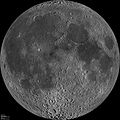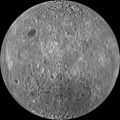- Moon Express
-
Moon Express, or MoonEx, is a privately held seed-stage company formed by a group of Silicon Valley and space entrepreneurs, with the goal of winning the Google Lunar X Prize, and ultimately mining the Moon for resources of economic value.[1]
Contents
History
In April 2011, Naveen Jain, Barney Pell[2] and Robert D. Richards,[3] co-founded Moon Express, a Mountain View, California-based company that plans to mine the moon[4] for elements that are rare on the earth, including Niobium, Yttrium and Dysprosium".[5]
As of April 2011[update], MoonEx has 25 employees, plans to stage a public demonstration of its hardware in the coming months, and has announced that they will be ready to land on the Moon by 2013.[1]
On September 11, 2011, MoonEx announced that it had set up a robotics lab for a lunar probe named the “Moon Express Robotics Lab for Innovation” (MERLIN) and hired several engineering students who had successfully competed at the First Robotics Competition.[6]
Initial contract
MoonEx has received a NASA contract for data purchase that could be worth up to US$10,000,000.[1][7] Moon Express is also partnered with NASA through a Reimbursable Space Act Agreement that allowed Moon Express to invest over $500K into the commercialization of technology developed by NASA.[3]
Legal regime for lunar resource extraction
Although the requisite legal regime to enable mining of lunar resources is not fully in place,[8] major world space agencies, including NASA, have put in place a coordination framework for encouraging the type of commercial activity proposed by Moon Express.
"Entrepreneurs are thinking about further commercial expansion into space. As space exploration extends to the Moon and Mars, there will be potential opportunities for companies to provide ... space-based resource extraction and processing capabilities. For example, Moon rocks are rich in oxygen that might be exploited to provide life support systems for lunar operations. Liquid oxygen can also be used as a rocket propellant – and it might be more economical to manufacture it in space than to lift it off the Earth. Mining the Moon might also yield titanium – a strong but light metal favoured for high-end aerospace applications. Finally, the Moon’s known abundance of Helium-3 could prove valuable if fusion reactors ever become feasible in the future.[9]
"For business to be confident about investing, it needs the certainty of a long-term commitment to space exploration, the opportunity to introduce its ideas into government thinking, and the rule of law. This means common understanding on such difficult issues as property rights and technology transfer. The Coordination Mechanism foreseen as part of the Global Exploration Strategy will provide a forum to discuss these important issues."[9]
The views of Moon Express on the legal and political realities of lunar resource utilization were articulated in an April 2011 Los Angeles Times article where Naveen Jain was interviewed:
The idea of exploiting the moon's resources for private gain is not likely to be a concern, Jain said. The United States, he said, 'has already brought back moon rocks to our country without any other country fighting war over it.' 'I also think that the moon will be treated no differently than the international water in our oceans,' he added. 'In this case, no one really owns the water but any company or country can mine the resources … from the international water as long as they follow certain safety/moral guidelines.' Jain also noted that 'there is strong legal precedent and consensus of 'finders keepers' for resources that are liberated through private investment, and the same will be true on the moon. You don't have to own land to have ownership of resources you unlock from it. Moon Express will use existing precedents of peaceful presence and exploration set by the U.S. government 40 years ago.'[1]
Google Lunar X Prize
The company is also a competitor in the Google Lunar X PRIZE.[10] There are 29 groups competing for the Google Lunar X Prize. This prize will award $20 million to the first team to put a lander on the moon and deliver data, images and video from the landing site and 500 meters away by the December 2015.[2] The Outer Space Treaty of 1967, ratified by 100 nations, including the United States, forbids countries from claiming sovereignty over any part of the moon, but does not prevent private companies from building or staking claims on the moon. Mining could fall under similar legal parameters as fishing in international waters.[11]
On June 30, 2011, the company held its first successful test flight of a prototype lunar lander system called the Lander Test Vehicle (LTV) that was developed in partnership with NASA.[3]
See also
- Astrobotic Technology
- Exogeology
- Geology of the Moon
- Shackleton Energy Company
References
- ^ a b c d Hennigan, W.J. (2011-08-20). "MoonEx aims to scour moon for rare materials". Los Angeles Times. http://www.latimes.com/business/la-fi-moon-venture-20110408,0,1715396.story. Retrieved 2011-04-10. "MoonEx's machines are designed to look for materials that are scarce on Earth but found in everything from a Toyota Prius car battery to guidance systems on cruise missiles. ... The company is among several teams hoping to someday win the Google Lunar X Prize competition, a $30-million race to the moon in which a privately-funded team must successfully place a robot on the moon's surface and have it explore at least 1/3 of a mile. It also must transmit high definition video and images back to Earth before 2016. ... should be ready to land on the lunar surface by 2013."
- ^ a b Caulfield, Brian. "Naveen Jain: 'Think Of The Moon As Just Another Continent'". Forbes. http://www.forbes.com/sites/briancaulfield/2011/07/22/billionaire-naveen-jain-think-of-the-moon-as-just-another-continent/. Retrieved August 16, 2011.
- ^ a b c "Moon Express Announces First Successful Flight Test of Lunar Lander System Developed With NASA Partnership". Moon Express. http://www.spaceref.com/news/viewpr.html?pid=33991. Retrieved August 16, 2011.
- ^ "The New Space Biz: Companies Seek Cash In The Cosmos accessdate=August 16, 2011". http://www.huffingtonpost.com/2011/07/22/new-space-business_n_907358.html.
- ^ "Moving the heaven to get some rare earth". Chennai, India: The Hindu. June 2, 2011. http://www.hindu.com/seta/2011/06/02/stories/2011060251761300.htm. Retrieved June 7, 2011.
- ^ "Moon Express rolls out new lab for lunar robotics". MF Monitor. September 11, 2011. http://www.microfinancemonitor.com/2011/09/11/moon-express-rolls-out-new-lab-for-lunar-robotics. Retrieved September 11, 2011.
- ^ Hennigan, W.J. (2011-04-08). "MoonEx aims to scour moon for rare materials". Los Angeles Times. http://www.latimes.com/business/la-fi-moon-venture-20110408,0,1715396.story. Retrieved 2011-04-10.
- ^ Moon, Mars, Asteroids: Where to Go First for Resources? SSI-TV video archive, recorded on November 9, 2010, 74:37, panel discussion held during the Space Studies Institute’s Space Manufacturing 14 conference in California. "Moderated by tech investor Esther Dyson, the discussion included: Prof. Michael A'Hearn, University of Maryland, Dept. of Astronomy, Prof. Greg Baiden, Penguin Automated Systems, Mark Sonter, Asteroid Enterprises Pty Ltd, Prof. John S. Lewis, Space Studies Institute, Dr. Paul Spudis, Lunar and Planetary Institute, and Jeff Greason, XCOR Aerospace."
- ^ a b The Global Exploration Strategy: the Framework for Coordination, ASI (Italy), BNSC (United Kingdom), CNES (France), CNSA (China), CSA (Canada), CSIRO (Australia), DLR (Germany), ESA (European Space Agency), ISRO (India), JAXA (Japan), KARI (Republic of Korea), NASA (United States of America), NSAU (Ukraine), Roscosmos (Russia), section 3 "Theme 3: Economic Expansion", pp. 10-12, May 2007, accessed 2011-01-05.
- ^ "Intelius’ Naveen Jain Turns to Moon Mining, Philanthropy". IndiaWest.com. May 9, 2011. http://www.indiawest.com/readmore.aspx?id=3263&sid=1. Retrieved June 7, 2011.
- ^ "With shuttle's end, X Prize race to the moon begins". The Seattle Times. http://community.seattletimes.nwsource.com/mobile/?type=story&id=2015689643&. Retrieved August 16, 2011.
External links
Robotic exploration of the Moon Programs Orbiters Planned Proposed Flybys Impactors Landers Rovers S. Return Cancelled See also - Moon
- Exploration of the Moon
- Colonization of the Moon
- Manned lunar spacecraft
- List of artificial objects on the Moon
- List of current and future lunar missions
- List of lunar probes
- Apollo
- CCCP manned lunar plan
Bold italics indicates active missionsLunar rovers Succeeded Lunokhod programme: Lunokhod 1 (1970) • Lunokhod 2 (1973)
Apollo program: Lunar Roving Vehicle (Apollo 15, 1971 • Apollo 16, 1972 • Apollo 17, 1972)
Proposed Chandrayaan-2 (2013) • Chang'e 3 Rover (2013) • ATHLETE (2010s) • Space Exploration Vehicle (2010s) • Scarab (2010s) • Astrobotic Red Rover (2013)Bold italics indicates active missionsCategories:- Spaceflight
- Exploration of the Moon
- Private spaceflight companies
- Google Lunar X Prize
- Proposed spacecraft
Wikimedia Foundation. 2010.



